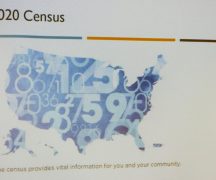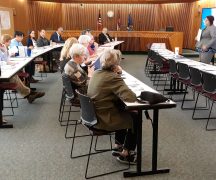By JAN LARSON McLAUGHLIN
BG Independent News
The U.S. Census Bureau is hiring 1,381 people in Wood County to help with the 2020 count. So far, the hiring effort has rounded up 710 workers – leaving 671 spots unfilled.
“I’m glad the economy is doing good, but it is dampening our efforts,” said Jodi Jenkins Reitz, a recruiting manager with the U.S. Census Bureau assigned to recruit for 28 counties in Ohio, including Wood. “I am struggling to reach people in your county.”
Reitz said the benefits of the census jobs are many – with the pay ranging from $18 to $20 an hour, paid training, mileage of 58 cents per mile, and weekly paychecks. The hours are flexible, and may be squeezed in around other full-time jobs.
Applicants do not need resumes, educational degrees, experience, or diplomas. They must be over age 18 and have a Social Security number.
“Everyone’s welcome to apply,” Reitz said.
Most of the workers needed in Wood County are census takers in the field. That means they will be given I-Pads and go door-to-door to households that have not responded to the mailed out census forms.
Workers will ideally be assigned to their neighborhoods.
“We really want people who know the county,” Reitz said. “Neighbors are more likely to respond to people they know.”
Anyone interested in a census job can apply at 2020CENSUS.GOV/JOBS or text JOBS2020 to 313131.
Hiring is going on now, with the door-to-door campaign to start in late April and continue through July.
“Even if you have a full-time job, it’s nice extra money,” Reitz said.
The survey, done every 10 years by mandate of the U.S. Constitution, will be conducted starting in mid-March, when most of the country will receive letters instructing them on ways to respond.
Much rests on the census count, Reitz said.
The numbers gathered will determine how the 435 congressional seats are divided among the states, and how nearly $675 billion in federal funding is dispersed annually.
“I don’t think most people know how much money is tied to the census,” Reitz said.
The count affects funding for education, health care, transportation, social services, emergency responders, plus services for elderly and for people with disabilities. Businesses are also able to use the information to decide where to put or expand operations.
“If people don’t get counted, the government doesn’t know they are there,” Reitz said. “It’s crucial.”
That includes undocumented immigrants, she said.
“They are using the resources of that community,” she said.
New this time is the ability for residents to respond online, in addition to by mail. Responses are required from all U.S. residents.
People who don’t respond on their own will receive home visits from census workers.




